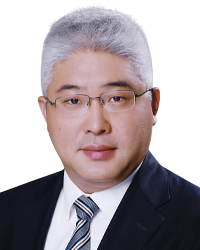PEER PRESSURE is a real thing, but so is peer support. Lately, confronted with mounting compliance and regulatory pressure, seemingly non-rhythmic industry swings, and concerns in global markets, China’s in-house counsel often find comfort in the sharing of both relatable experiences and acute insights from fellow legal practitioners as their community looks towards a new year with hopes for clarity, certainty and potential for growth.
To gain insight into the opportunities and challenges awaiting in-house counsel this year, China Business Law Journal invited five legal team leaders, hailing from a variety of industries, to discuss their team building agenda, expectations, trepidations and manoeuvres to stay ahead in the game in 2024.
Our participants are:
- Zhong Xueyin, General Counsel, Caocao
- Huang Huina, General Manager of Legal and Risk Management, China Power Management
- Richard Nie, General Counsel, Schaeffler Greater China
- Zhu Haojiang, Deputy Director of Legal Department, SAIC General Motors
- Zhou Feng, Chief Compliance Officer, Taikang Asset Management
Zhong Xueyin
China Business Law Journal: What opportunities and challenges are expected from 2024?
Zhong Xueyin: Lately, many speak of downgrading consumption in China, which at the corporate level translates as improving efficiency and lowering cost. However, Caocao is a company still aspiring for growth, with room to increase market share. In these situations, functions like legal often bear the brunt of cost pressures.

General Counsel
Caocao
The demand for business growth is easily voiced, but becomes challenging to achieve when staff and costs in the back-end departments cannot be increased. In services like ride-hailing, in which Caocao is engaged, litigation and legal work are tied to the number of orders and volume of business, arising in tandem with the business activities.
Naturally, there’s a collective desire to boost operational efficiency by becoming more systematic, automated and template-driven, yet this task is also easier said than done. Implementing standardisation and creating templates also add to the workload, while the practical benefits of AI tools like ChatGPT for enhancing work efficiency remain under observation.
In summary, I believe the challenges are quite apparent, but they also present opportunities. When everyone is facing challenges, can we respond to difficulties more effectively?
CBLJ: What legislative, regulatory or policy updates may significantly impact your company’s legal affairs this year?
Zhong Xueyin: I pay particular attention to the legal aspects of two sectors, starting with the new dynamics in capital markets. It has been a year since the filing requirement was put in place for overseas listing, and it has had a significant impact on the IPO market, raising several questions.
For instance, are variable interest entity (VIE) agreements completely acceptable under this filing system? What level of capitalisation should there be within a group when a member goes public? There is considerable debate in the market on these issues, and the process of finding clarity is ongoing.
In terms of macro policy, will market access regulations be relaxed or tightened? If the A-share market is tightened, might there be a relaxation in opportunities for overseas fundraising? We still face significant uncertainty in this regard.
Another focus is on the laws and regulations related to data compliance, personal privacy and information security. In the past two to three years, the trend towards clarification and stricter regulation in this area has been evident, with an increasing number of enforcement cases.
Nevertheless, this is a highly specialised and emergent field. Can we find a suitable external professional team to help us address complex issues? Facing an increasingly intricate regulatory environment for information security and personal data protection, can our own team keep up with these rapid changes? I find this area quite challenging.
CBLJ: In terms of team management, how do you plan to continually enhance the team’s strength and cohesion?
Zhong Xueyin: In the KPIs [key performance indicators] I’ve set for my team, there’s a section dedicated to self-learning. This could involve areas not directly related to work, but which we deem necessary to learn about, such as investment and data knowledge.
Daily work can be tiring, and systematic learning often falls into the category of important but not urgent, leading to less personal growth. Therefore, I’ve established clear priorities and task attributes for personal learning.
Also, I recently came across an interesting twist on the financial term EBITDA (earnings before interest, taxes, depreciation and amortisation). In a work context, it’s been humorously redefined as “earnings before interest, therapy, depression and anxiety”.
It’s inevitable to encounter negative emotions in the workplace, especially in a support-oriented department like legal. Therefore, I believe it is crucial as a manager to help the team resolve negative feelings, maintaining motivation and happiness, particularly in an era where business growth may decelerate.
Huang Huina
China Business Law Journal: What opportunities and challenges are to be expected from 2024?

General Manager of Legal and Risk Management
China Power International
Huang Huina: By the end of 2023, China’s renewable energy power station installations exceeded 50% of total power capacity, surpassing thermal power for the first time. Worldwide, the push for clean energy continues. We expect the global demand for renewable energy, the investment trend in renewables and the engagement of Chinese firms in overseas clean energy projects to persist in 2024. Nonetheless, as Chinese companies grow their international presence, they face increasing challenges.
In the past year, with the EU’s anti-subsidy rules in effect, multiple countries including the US launched anti-tax evasion probes against Chinese PV component firms, and Brazil removed import tax benefits for PV components. These changes in international laws call for new approaches for Chinese power companies’ overseas expansion. Thus, close attention to host countries’ legal and judicial risks, along with political developments, is crucial to navigate the opportunities and challenges of 2024.
CBLJ: What legislative, regulatory or policy updates may significantly impact your company’s legal affairs this year?
Huang Huina: In 2024, we anticipate the EU will offer more guidance on filings under its anti-subsidy regulations, and we look forward to practical case analyses and recommendations from law firms, both domestic and international. Furthermore, we are closely monitoring global policy trends on Chinese PV and wind turbine component imports, and anti-evasion taxes including Brazil’s recent move to revoke foreign PV component tariff exemptions.
Additionally, the recently revised Company Law will be implemented starting in July, introducing new requirements for corporate governance and director responsibilities. As a global Chinese state-owned enterprise, how to align the new stipulations of the Company Law with the actual circumstances of our subsidiaries both at home and abroad – and how this alignment can aid the development of our international business – is a new issue we need to study in depth.
CBLJ: What are your team’s key new year agendas?
Huang Huina: China Power International will persist in developing new ventures like integrated intelligent energy and refine our compliance management systems in the new year. In 2023, we achieved certification for the ISO 37301 compliance management system from the British Standards Institution (BSI), becoming one of the first in China’s overseas investment sector and a pioneer in the power industry abroad to receive this certification.
Due to the complex nature of new business models which, compared to traditional centralised projects are more prone to disputes and compliance issues, special attention must be given to the legal and regulatory risks in host countries.
Additionally, we will persist in applying domestic expertise and energy management service models to enhance our overseas compliance systems, using compliance to drive business growth and aiming to lead international development among state-owned power industry enterprises.
CBLJ: In terms of team management, how do you plan to continually enhance the team’s strength and cohesion?
Huang Huina: Firstly, cultivate and maintain a proactive attitude towards new environments, technologies and business models, applying both legal and commercial thinking to specific business areas. As business transformations and new ventures arise, in-house counsel must keep their specialisation while swiftly acquiring new skills and knowledge to match business evolution. The China Power International legal team will keep engaging on the front lines, learning and honing skills to provide solutions for the most practical and cutting-edge issues.
Secondly, while addressing legal risks, we will place greater emphasis on business risks, maintain commercial awareness, and consider the long-term comprehensive development of projects from the company’s larger perspective.
Thirdly, we will maintain close ties with affiliate entities, upstream and downstream companies, external consultants, and professional institutions, as well as invite industry experts for exchanges and training to further enhance our team’s professional expertise.
CBLJ: What are your expectations for overall development of the legal industry in the new year?
Huang Huina: As market competition intensifies and the “going global” strategy advances, state-owned enterprises face a more complex legal landscape, highlighting the growing importance of legal professionals in business development. Serving as a bridge for internal and external communication, in-house counsel encounter increasingly diverse challenges with business expansion. We must play a proactive role from both the external environmental and internal motivational perspectives to effectively support the company’s core business for stable and long-term success.
Additionally, we aim to leverage the positive role of the legal community to foster collaborative win-win relationships between in-house counsel and external lawyers. We expect lawyers to thoroughly understand our business model to offer comprehensive, needs-based services with the ability to solve real-world problems, providing forward-looking support and assistance. Looking ahead, we anticipate the legal industry to offer more comprehensive legal protection and support, helping to drive sustainable growth and development for businesses.
Richard Nie
China Business Law Journal: What opportunities and challenges are to be expected from 2024?

General Counsel
Shaeffler Greater China
Richard Nie: For me, a major event in 2024 is the integration of Schaeffler and Vitesco, both multinational corporations. The formation of the “new Schaeffler” group is set to reshape the global competitive landscape of the automotive components and industrial manufacturing sectors, necessitating my team and I to stay current.
We anticipate encountering more risks and obstacles than before, with increased uncertainty and complexity, as we face new clients, markets, technologies, products and business models, along with profound corporate needs for safe operation, transformation and innovation.
In particular, we will face significant challenges in talent development, advancing legal affairs, and optimising processes and resources.
Certainly, our legal team and counsel have significant opportunities. By serving as the “nervous system” and “information centre” in corporate integration, we can enhance our pivotal role in regulation, service and enablement.
Contributing knowledge, skills and experience, and fostering effective partnerships and synergies with business departments, we can develop a robust and practical framework of process maps, comprehensive risk assessments and control rules across all corporate functions. This presents the chance to forge a more enterprising team and realise shared growth for individuals and the organisation.
CBLJ: What legislative, regulatory or policy updates may significantly impact your company’s legal affairs this year?
Richard Nie: Beyond the revised Company Law set to be implemented in 2024, I expect shifts in intellectual property protection, market entry (especially foreign investment controls), fair competition and open collaboration, dismantling of local protectionism and regional barriers, ongoing enhancement of the business environment, social credit system establishment, and trade and supply chain compliance to substantially affect our legal functions.
CBLJ: What are your team’s key new year agendas?
Richard Nie: Through the Schaeffler and Vitesco integration project, our key objective is to build a “stronger together” legal team that innovates legal solutions, actively integrates with business as strategic partners, and safeguards the “new Schaeffler”.
This goal will primarily encompass the integration of comprehensive legal affairs – including team organisational framework, roles and responsibilities, operational models and overarching legal risk management – aimed at aiding the business in controlling legal risks and liabilities, protecting assets and enhancing profits, boosting market competitiveness, and ensuring corporate governance remains at the forefront, thereby successfully completing the integration process.
Our major agenda involves enhancing the post-merger team’s strength and cohesion by managing internal and external relationships; fostering a positive work environment and career progression; optimising resources and processes; advancing legaltech applications, tools and operational guidelines; and reinforcing the sharing and transfer of knowledge and experience.
CBLJ: In terms of team management, how do you plan to continually enhance the team’s strength and cohesion?
Richard Nie: I plan to focus on “high-performance” actions – particularly through initiatives like pushing the margins, building a home base and rites of passage – to stimulate high-performance collaboration among in-house counsel while continuously enhancing team strength and cohesion.
Specifically, first is to enhance the team’s professional and soft skills through coaching, boot camps and workshops, with a focus on strategic thinking, project management, decision-making and change management training.
Second is to implement delegation and teamwork to foster a team rhythm and combativeness based on trust, transparency, agility and accountability, thereby establishing sustained influence and a strong brand within the organisation.
Third is to engage in effective communication to ensure the quality, speed and cost of the team’s legal work, balancing effectiveness and efficiency to achieve a reasonable equilibrium between productivity and morale.
CBLJ: What are your expectations for overall development of the legal industry in the new year?
Richard Nie: I look forward to the new year where legal professionals can engage more in positive and constructive exchanges, sharing and collaboration, maintain their passion and enjoyment for work, and together create a healthy industry ecosystem.
Zhu Haojiang
China Business Law Journal: What opportunities and challenges are to be expected from 2024?

Deputy Director of Legal Department
SAIC General Motors
Zhu Haojiang: In 2024, legal teams face challenges in three main areas. Firstly, in a highly competitive market, compliance counsel must balance three roles: guardians of company governance; providers of legal services; and participants in business decision-making.
Secondly, a rapidly changing legal and regulatory environment necessitates legal teams to closely monitor developments in compliance, anticipating legislative and enforcement trends. Familiarity with both Chinese and international laws relevant to our business is also essential.
Finally, the application of AI presents challenges to legal operations, and leveraging AI to enhance efficiency will be a key consideration for legal teams this year.
CBLJ: What legislative, regulatory or policy updates this year may significantly impact your company’s legal affairs?
Zhu Haojiang: In the short term, more laws and regulations regarding data compliance will continue to be introduced, expanding both in depth and breadth.
Additionally, the European Parliament recently approved the EU Artificial Intelligence Act, laying out future rules and regulatory focus points for AI. It is anticipated that, as AI technology evolves, laws and regulations in this field will progressively strengthen across the globe.
CBLJ: What are your team’s key new year agendas?
Zhu Haojiang: For the legal team, our aim is to align more closely with business operations, considering legal issues from the business perspective, rather than offering advice as an outsider.
Only by positioning ourselves as part of the business can in-house counsel truly understand the business needs and work towards the common goal of sustainable development.
CBLJ: In terms of team management, how do you plan to continually enhance the team’s strength and cohesion?
Zhu Haojiang: Firstly, we advocate for a learning-oriented organisation, which encompasses not just professional field studies but also learning about various technologies and operations within the company’s business chain. Only with an understanding in these areas can we propose practical legal solutions.
Secondly, we encourage looking outward and learning from exemplary teams both within and outside the industry. Through mutual exchange, we aim to learn and understand the best practices of legal teams across various sectors.
Finally, we advocate for a dual-track system to enhance legal personnel career development choices. Thus, in-house counsel have opportunities to grow not just into managerial roles, but also, by continually developing expertise, become “experts”.
Zhou Feng
China Business Law Journal: What opportunities and challenges are to be expected from 2024?

Chief Compliance Officer
Taikang Asset Management
Zhou Feng: The year presents both opportunities and challenges for insurance asset management institutions. On the opportunity side, the growth of emerging fields – such as fintech, digital transformation and green economy, coupled with the revival of the consumer market and increasing focus on health and retirement needs – are set to create new investment prospects.
We can increase our risk management presence within more innovative investment areas, and leverage technological advancements to enhance service efficiency.
In the meantime, under the overarching theme of strict financial supervision aimed at risk prevention, regulatory oversight has become more stringent, with a noticeable increase in the intensity of regulatory penalties. Furthermore, under the unified regulatory framework for banking, securities and insurance, the complexity of the regulatory system we face is also rising.
These new dynamics, along with increased market volatility and the diversification of investor demands, are set to pose greater challenges to our company’s compliance management and risk control capabilities.
CBLJ: What legislative, regulatory or policy updates may significantly impact your company’s legal affairs this year?
Zhou Feng: Keeping abreast and interpreting regulatory developments has always been a focal point of our legal team’s work.
In 2024, we anticipate several policy changes related to the regulation of financial markets, including those pertaining to open market investment and the deployment of insurance funds.
Additionally, new policies concerning pension services, consumer rights protection and data security are expected to be introduced. These changes will demand a higher level of expertise from us.
Our work will concentrate on addressing new compliance requirements and controlling newly identified risk points resulting from policy changes. This includes how to rectify and integrate existing business practices, and how to adjust evaluation standards for new investment.
Our research will also encompass all aspects of compliance and suitability management for various investment types and methods.
CBLJ: What are your team’s key new year agendas?
Zhou Feng: Our plans for the new year will focus on three key areas: risk prevention, innovative research, and efficiency enhancement. In the context of stringent financial regulation, risk prevention will be our top priority.
We will comprehensively review existing businesses in light of changing regulatory environments, identify business risks at the earliest opportunity, and promote the development and implementation of risk resolution strategies.
At the same time, we will keep a finger on the pulse of new policies and business ventures, promptly identify new challenges in business models, and focus our research on new directions. Building on which, we aim to promote standardisation, providing the company with compliance forecasts.
Furthermore, by utilising digital innovation tools, we will conduct structured analyses of key points in compliance and legal risk assessments, standardise the team’s review metrics, and enhance the efficiency of legal evaluations.
CBLJ: In terms of team management, how do you plan to continually enhance the team’s strength and cohesion?
Zhou Feng: In the past few years, we have been committed to becoming a leading team among peers in professionalism and management effectiveness. In 2024, we will continue to enhance our team’s strength and cohesion by adhering to “three persistences”.
Firstly, we persist in being research-driven, closely following regulatory policies, deepening research into the hot and difficult issues in our business, and nurturing team members to become specialists in their respective fields of business engagement.
Secondly, we persist in internal sharing and collaboration, fostering mutual learning and progress among team members, and striving to evolve from being specialists to “generalists”.
Thirdly, we persist in implementing effective incentive mechanisms, evaluating individual contributions based on professional ability, teamwork and proactivity as key performance indicators, thus cultivating a harmonious and efficient work atmosphere.
CBLJ: What are your expectations for overall development of the legal industry in the new year?
Zhou Feng: I am looking forward to deeper integration of technological innovation in legal services this year. I hope to see the introduction of more intelligent legal service products that make it more efficient and accessible.
In addition, I expect that various participants in the legal industry – such as lawyers, in-house counsel, judges, prosecutors and scholars – will have more opportunities to engage in multidimensional discussions and learning on hot-button issues.
I look forward to the legal industry strengthening cross-sector collaboration and communication with other industries, enhancing sensitivity to the legal needs of these sectors, expanding the influence of the legal profession, and promoting its own sustainable development.






















